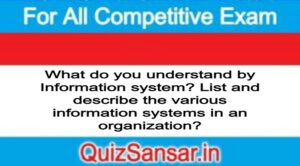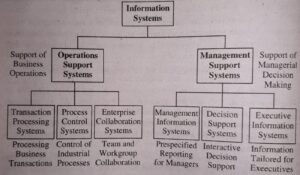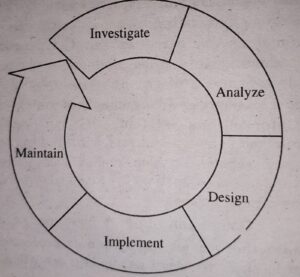
What do you understand by Information system? List and describe the various information systems in an organization?
What do you understand by Information system? List and describe the various information systems in an organization?
Or
“Business professional rely on many types of Information system that use a variety of information Technologies. Briefly explain the various classes of Information systems and the underlying Information Technologies.
Or
Discuss classification of Information System. Elaborate component and resources of Information System.
Ans.
Information System
An information system (IS) or application landscape- is any combination of information technology and people’s activities using that technology to support, management In a very broad sense, the term information system is frequently used to refer to the interaction between people, algorithmic processes, data and technology. In this sense, the term is used to refer not only to the information and communication technology (ICT) an organization uses, but also to the way in which people interact with this technology in support of business processes.
Some make a clear distinction between information systems, and computer systems ICT, and business processes. Information systems are distinct from information technology in that an information system is typically seen as having an ICT component. Information systems are also different from business processes. Information systems help to control the performance of business processes.
Alter argues for an information system as a special type of work system. A work system is a system in which humans and/or machines perform work using resources to produce specific products and/or services for customers. An information system is a work system whose activities are devoted to processing (capturing, transmitting, storing, retrieving, manipulating and displaying) information.
As such, information systems inter-relate with data systems on the one hand and activity systems on the other. An information system is a form of communication system in which data represent and are processed as a form of social memory. An information system can also be considered a semi-formal language which supports human decision making and action.
Information systems are the primary focus of study for the information systems discipline and for organisational informatics.
Types of Information Systems
Conceptually, the applications of information systems in the real world can be classified in several different ways. Figure illustrates this conceptual classification of information systems applications. Information systems are categorized this way to spotlight the major roles each plays in the operations and management of a business.
Operations and management classifications of information systems.
Operations Support Systems
Information systems have always been needed to process data generated by, and used in, business operations. Such operations support systems produce a variety of information products for internal and external use. The role of a business firm’s operations support systems is to efficient process business transactions, control industrial processes support enterprise communications and collaboration, and update corporate databases.
Transactions processing systems are an important example of operations support systems that record and process data resulting from business transactions. They process transactions in two basic ways. In batch processing, transactions data are accumulated and processed periodically. In real-time (or online) processing, data are processed immediately after a transactions occurs.
Process control systems monitor and control physical process. For example, a petroleum refinery uses electronic sensors linked to computers to continually monitor chemical processes and make instant (real-time) adjustments that control the refinery process.
Enterprise collaboration systems enhance team and workgroup communications and productivity

, and are sometimes called office automation systems. For example, the project team members may use electronic mail to send and receive electronic messages, and video conferencing to hold electronic meetings to coordinate their activities.
Management Support Systems
When information system applications focus on providing information and support for effective decision making by managers, they are called management support systems. Conceptually, several major types of information systems support a variety of decision-making responsibilities: (1) management information systems, (2) decision support systems, and (30 executive information systems.
Management information systems provide information in the form of reports and displays to managers and many business professionals. For example, sales managers may use their computers to get instantaneous displays about the sales results of their products and to access their corporate intranet for daily sales analysis reports.
Decision support systems give direct computer support to managers during the decision-making process. For example, advertising managers may use an electronic spreadsheet program to do what-if analysis for forecasted sales of new products.
Executive information systems provide critical information from a wide variety of internal and external sources in easy-to-use displays to executives and managers. For example, top executives may use touchscreen terminals to instantly view text and graphics displays their highlight key areas of organizational and competitive performance.
Other Classification of Information Systems
Several other categories of information systems can support either operations or management applications. For example :
Expert systems can provide expert advice for operational chores like equipment diagnostics, or managerial decisions such as loan portfolio management.
Knowledge management systems are knowledge based information systems that support the creation, organization, and dissemination of business knowledge to employees and managers throughout a company. Information systems that focus on operational and managerial applications in support of basic business functions such as accounting or marketing are known as functional business systems. Finally, strategic information systems apply information technology to a firms products, services, or business process to help it gain a strategic advantage over its competitors.
In practice, these roles are combined into integrated or cross functional informational systems that provide a variety of functions. Thus, most information systems are designed to produce information and support decision making for various levels of management and business functions, as well as do record-keeping and transaction processing chores.
Operations Support Systems
◆ Transaction processing systems: Process data resulting from business transactions, update operational databases, and produce business documents. Examples: sales and inventory processing and accounting systems.
◆Process control systems: Monitor and control industrial processes. Example: petroleum refining, power generation, and steel production systems.
◆ Enterprise collaboration system : Support team, workgroup, and enterprise communications collaboration. Example: E-mail, chat, and video-conferencing groupware systems.
◆ Management Information systems: Provide information in the form of prespecified reports and displays to support business decision making. Examples: sales analysis, production performance, and cost trend reporting systems.
◆ Decision support systems: Provide interactive ad hoc support for the decision-making process of managers and other business professionals. Examples: product pricing, profitability forecasting, and risk analysis systems.
◆Executive information systems: Provide critical information from many sources tailored to the information needs of executive. Examples: systems for easy access to analyses of business performance, actions of competitors, and economic developments to support and strategic planning.
◆Expert systems: Knowledge-based systems that provide expert advice and act as expert consultants to users. Examples: credit application advisor, process monitor, and diagnostic maintenance systems.

◆ Knowledge management systems: Knowledge-based systems that support the creation, organization, and dissemination of business knowledge within the enterprise. Examples: intranet access to best business practices sales proposal strategies, and customer problem resolution systems.
◆Strategic information systems: Support operations or management processes that provide a firm with strategic products, services, and capabilities for competitive advantage. Examples: online stock trading, shipment. tracking, and E-commerce Web systems.
◆Functional business systems : Support a variety of operational and managerial applications the basic business functions of a company. Examples: information systems that support applications in accounting, finance, marketing, operations management, and human resource management.






